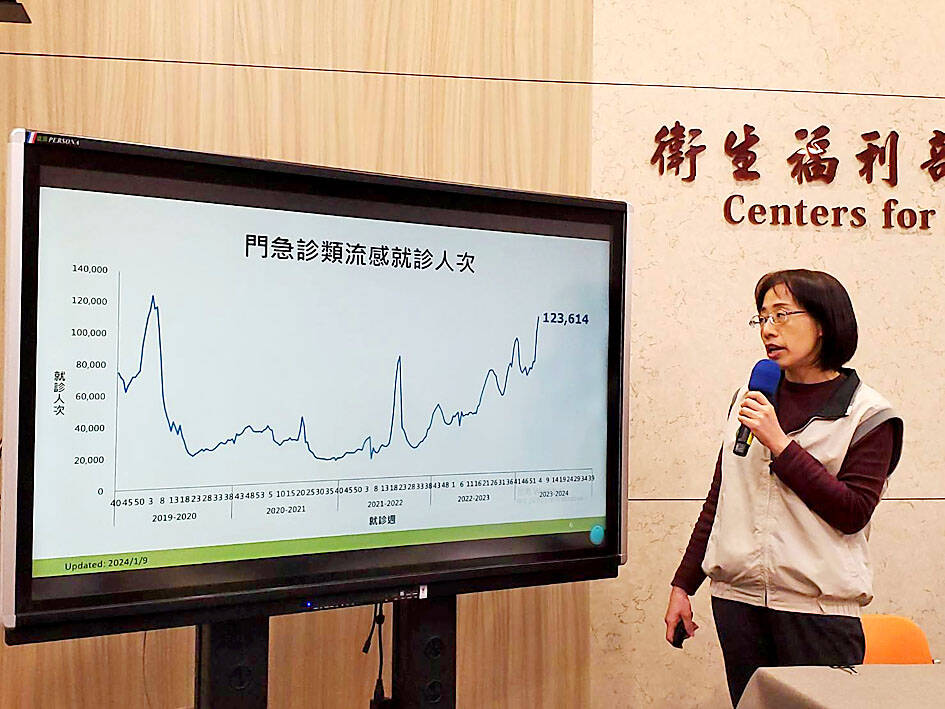Hospitals reported 123,614 visits for influenza-like illnesses last week, the highest in a decade for the first week of the year, the Centers for Disease Control (CDC) said yesterday, adding that the peak is likely to occur the week before the Lunar New Year holiday next month.
Hospital visits for flu-like illnesses increased from 109,394 a week earlier and 85,912 two weeks earlier, CDC Epidemic Intelligence Center Deputy Director Lee Chia-lin (李佳琳) said.
Forty-one people were hospitalized with serious flu complications and three people died from flu-related conditions last week, Lee said, adding that of those in a serious condition, 30 were unvaccinated and 33 had underlying health conditions.

Photo: Lin Hui-chin, Taipei Times
All of those who died were unvaccinated and had underlying health conditions, she said, adding that most of them had the influenza A (H3N2) virus.
The most common respiratory viruses identified at contracted laboratories in the past four weeks were adenoviruses, accounting for 43 percent, followed by flu viruses (29.8 percent) and parainfluenza viruses (11.9 percent), she said.
Given the uptrend in hospital visits, the peak week is expected to be Jan. 28 to Feb. 3, the week before the Lunar New Year holiday, with about 150,000 hospital visits expected in the seven days, CDC Deputy Director-General Philip Lo (羅一鈞) said.
The peak would be the second-highest in a decade, following the 200,000 hospital visits during a cold wave in East Asia in late January 2016, Lo said.
The high number this year is mainly due to a lack of immune stimulation because of measures implemented during the COVID-19 pandemic in the past three years, he said.
People should get vaccinated and seek medical attention right away if they have emergency symptoms such as shortness of breath, difficulty breathing, or gray or blue, lips or nail beds, CDC physician Lin Yung-ching (林詠青) said, adding that vaccination was especially important for elderly people, children, pregnant women and people with underlying conditions, who are at higher risk of developing severe complications.
Hospitalizations for COVID-19 increased by 43 percent to 515 people last week, with 97 percent among them not having received the XBB1.5-adapted vaccine, Lee said.
Genomic data from the past four weeks showed that EG.5 was still the most common strain spreading locally, accounting for 63 percent of cases, followed by the new JN.1 strain at 24 percent, the CDC said, adding that JN.1 was the dominant strain among imported cases.
The 515 people hospitalized last week marked the highest weekly number in five months and the 48 deaths was the highest in four months, Lo said, adding that case numbers are also expected to peak around the Lunar New Year holiday.
While the JN.1 subvariant has not spread as fast locally as predicted, it might still replace EG.5 to become the dominant strain locally before the holiday and cause another wave of infections, he said.
Some foreign studies suggest that the effectiveness of the XBB1.5-adapted vaccine against hospitalization is about 60 to 70 percent, while vaccine-induced antibodies from previous vaccination might have significantly waned after six to nine months, so the CDC encourages people to get the new XBB1.5 vaccine, he said.
From yesterday, indigenous people aged from 55 to 64 years would be included in eligibility for government-funded pneumococcal polysaccharide vaccines, with the expanded eligibility criteria expected to benefit about 77,000 people, the CDC said.

An essay competition jointly organized by a local writing society and a publisher affiliated with the Chinese Communist Party (CCP) might have contravened the Act Governing Relations Between the People of the Taiwan Area and the Mainland Area (臺灣地區與大陸地區人民關係條例), the Mainland Affairs Council (MAC) said on Thursday. “In this case, the partner organization is clearly an agency under the CCP’s Fujian Provincial Committee,” MAC Deputy Minister and spokesperson Liang Wen-chieh (梁文傑) said at a news briefing in Taipei. “It also involves bringing Taiwanese students to China with all-expenses-paid arrangements to attend award ceremonies and camps,” Liang said. Those two “characteristics” are typically sufficient

A magnitude 5.9 earthquake that struck about 33km off the coast of Hualien City was the "main shock" in a series of quakes in the area, with aftershocks expected over the next three days, the Central Weather Administration (CWA) said yesterday. Prior to the magnitude 5.9 quake shaking most of Taiwan at 6:53pm yesterday, six other earthquakes stronger than a magnitude of 4, starting with a magnitude 5.5 quake at 6:09pm, occurred in the area. CWA Seismological Center Director Wu Chien-fu (吳健富) confirmed that the quakes were all part of the same series and that the magnitude 5.5 temblor was

The brilliant blue waters, thick foliage and bucolic atmosphere on this seemingly idyllic archipelago deep in the Pacific Ocean belie the key role it now plays in a titanic geopolitical struggle. Palau is again on the front line as China, and the US and its allies prepare their forces in an intensifying contest for control over the Asia-Pacific region. The democratic nation of just 17,000 people hosts US-controlled airstrips and soon-to-be-completed radar installations that the US military describes as “critical” to monitoring vast swathes of water and airspace. It is also a key piece of the second island chain, a string of

The Central Weather Administration has issued a heat alert for southeastern Taiwan, warning of temperatures as high as 36°C today, while alerting some coastal areas of strong winds later in the day. Kaohsiung’s Neimen District (內門) and Pingtung County’s Neipu Township (內埔) are under an orange heat alert, which warns of temperatures as high as 36°C for three consecutive days, the CWA said, citing southwest winds. The heat would also extend to Tainan’s Nansi (楠西) and Yujing (玉井) districts, as well as Pingtung’s Gaoshu (高樹), Yanpu (鹽埔) and Majia (瑪家) townships, it said, forecasting highs of up to 36°C in those areas